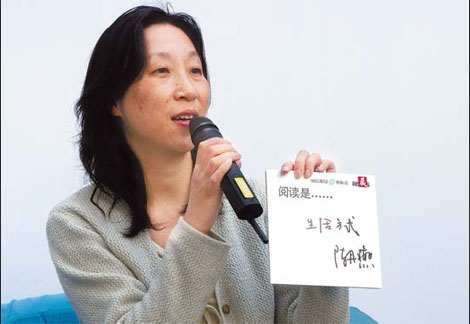Life and Leisure
Chronicling days of glory
By Chitralekha Basu (China Daily)
Updated: 2010-08-23 13:26
 |
Large Medium Small |

Fairmont Peace Hotel, an iconic landmark of Shanghai, offers the backdrop of Chen Danyan's latest novel, her magnum opus. Niu Yixin / For China Daily |
Author Chen Danyan's contemporary writings of Shanghai have become nostalgic musings on the city's transformation. Chitralekha Basu reports
The much-publicized reopening of Shanghai's Peace Hotel (now Fairmont Peace Hotel), after three years of a massive overhaul, has left the writer Chen Danyan confused.
For nearly 10 years, she had been working on a novel that captures the saga of the iconic landmark, the glowing green pyramid top of which shines like a beacon on Shanghai's waterfront - its journey from 1929 to the present.
She had hoped to wrap up the voluminous work this year. But a tour of the newly renovated hotel - with its suddenly unending lobby, a dazzling ceiling, the all-too-smooth bar counter, all set against a wooden paneling backdrop - seems to have caught her off guard.
"There's too much shine there," Chen says, adding that she can't quite figure out what to make of it.
"In a sense, this is typical of present-day Shanghai. It's reflective of the way its young and ambitious set are driven by the desire to get rich and show off, with utter disregard for tradition," she says. Chen compares it to an "old man getting a new trophy wife".
"It seems they didn't know which part of the hotel's traditional inheritance to retain and highlight. Now, it looks like just another new hotel."

Chen Danyan's writing draws heavily on her own experience. Zhou Wei / For China Daily |
Chen has single-mindedly focused on the hotel's intriguing history for the past decade. The establishment was built by Armenian-Jewish entrepreneur Victor Sassoon and turned into a municipal government office in 1949. It reopened in 1956 to accommodate the Russians who arrived to help build factories.
Chen did research in London's British Library and the India Office Library, where she tracked down the Sassoon family letters.
She has spent weeks living in the hotel, tiptoeing along its unusually long corridors at midnight, inspecting the lofty ceilings done up in Shanghainese deco style.
A few of the several people she interviewed had told her the hotel was haunted. One night she bumped into someone and her heart almost skipped a beat until she realized it wasn't really an apparition.
The book was going to be her magnum opus.
"Having been in the writing business for more than 25 years, I now feel I can attempt a big, fat tome," Chen says.
But the facelift has thrown her plans into disarray, she says.
"I think I will have to rewrite huge chunks of my book, adding new elements and characters," Chen says,
"I am so angry at, and disappointed with, myself. Perhaps I got it all wrong from the outset. Or maybe I am misunderstanding now. Maybe it's a case of a generation gap."
There's at least one more reason she is distraught.
For a couple of months now, Chen has been worried sick about her ailing 97-year-old aunt.
"She is the most important person in my life," she says, with a catch in her throat.
Chen grew up as the child of affluent parents in the 1960s. Her father, the director of a shipping company, was too taken up with his career. Her mother, Chen recalls, was busy participating in the "cultural revolution" (1966-76). It was her aunt, Ai Yue, who kept her company.
This unlettered woman, who never married and stayed away from politics, gave Chen her first exposure to traditional Chinese culture and value systems.
"She would tell me folktales. In fact, she is the one who pushed me to study. She would drive home how absolutely important it was for single women to be educated and be able to take care of oneself."
Ai's recent illness has turned Chen into a bundle of nerves.
But even in this moment of personal crisis, shuttling between home and the hospital, watching her closest relative suffer helplessly, Chen is capable of a writer's detachment.
She points out how their roles have reversed.
"She complains like a small child when she is in pain," Chen says.
Women's lives and their journeys through changing circumstances are stock themes in her writing, and, unsurprisingly, Chen's writing draws heavily on her own experiences.
Chen might be mistaken for a fidgety woman, trying to get her wits about, often interrupting her own readings of people and society and calling them into question.
Somehow, this apparent anxiety has never been at odds with her ability to put her finger on the project at hand and keep at it, sometimes for years at a stretch.
Every book she has written so far - be it teen fiction (Beautiful Sun in Chilly Winter, 1990), an autobiographical novel (The Girl, 1996), a travelogue (New York Holiday, 1994) or a work of life writing (Shanghai Princess, 2000) - is the product of exhaustive research combined with an acute insight.
And every one of these - by some mystical quality that only Chen seems to know how to work - are much-feted books, notching up enviable sales records.
No one can accuse the writer of not doing her homework.
When Chen was writing the heart-tugging stories of adolescent angst in the mid-1980s to early-1990s, she based her narratives on her experiences as a Children's Epoch Magazine reporter.
Chen moved on to exploring China's one-child norm, interviewing a whole gamut of children without siblings for a radio talk show broadcast on Shanghai Eastern Radio. The findings were turned into The Declaration of Single Children (1997) - the country's bestseller that year.
Shanghai Princess, documenting the extraordinary life of Australian-Chinese Daisy Kwok, was based on true stories surrounding the momentous events of 20th-century Chinese history.
The octogenarian Kwok, whom Chen met in 1990, was her primary source. The Sydney-born businessman's daughter came to live in Shanghai in 1917, when Sun Yat-sen invited her father to give the Chinese economy a fillip.
Her affluent and privileged lifestyle changed drastically in the 1960s to one of public denunciation and unmitigated suffering when her husband was condemned as a rightist and died in prison.
Kwok herself went through the rigors of hard labor - cleaning toilets, smelting iron, working in road construction.
Kwok found herself entirely alone in the newly entrepreneurial and more impersonal China of the 1990s. All of her relatives were dead or far away, but she maintained extraordinary poise, resilience and dignity.
Chen spent nearly seven years on Daisy's story, producing one of her most-popular - also her most-pirated - books to date.
Chen is absurdly self-effacing for a writer with more than 25 years of literary achievement and commercial success.
She talks like a devout disciple about the maestros of literature whom she has been reading all these years - James Joyce, Anton Chekov, William Faulkner and Wang Anyi, widely recognized as the most consummate chronicler of 20th-century Shanghai.
"It's amazing how a writer like Joyce or Wang could write for years and years about a particular city (Joyce's Dublin and Wang's Shanghai) and yet have something engagingly new to say about it," Chen says. "I'm not very good at it, although I sometimes try to follow Joyce."
Her engagement with Irish culture is manifest in her new book, Swimming Over to the Deepest Sea, published in June.
Based on her travels in Ireland, the book contains impressionistic essays on Celtic culture, the poet W.B. Yeats, folktales, such as the Leprechaun, and, unmistakably, her reading of the second chapter of Joyce's seminal novel Ulysses. The Irish cultural and tourism department has named this book as an essential read.
The sprightly 52-year-old happens to be one of the most well-traveled Chinese writers, having extensively toured Europe, the US, India, Japan and Russia.
"When I was young, China was closed," she explains.
"I was eager to find a new world which was, until then, only like an image I had read about in a novel. Now that the door has opened, I can see the world for what it is."
Wherever she goes, the writer in her - despite the peculiar love-hate relationship she shares with Shanghai - is still sold on the magnetic charm of her hometown.
"Turning my gaze toward other parts of the world is almost like seeing Shanghai reflected in a mirror," she says.
"It's my chance to compare Shanghai's inadequacies, its otherness, with them."